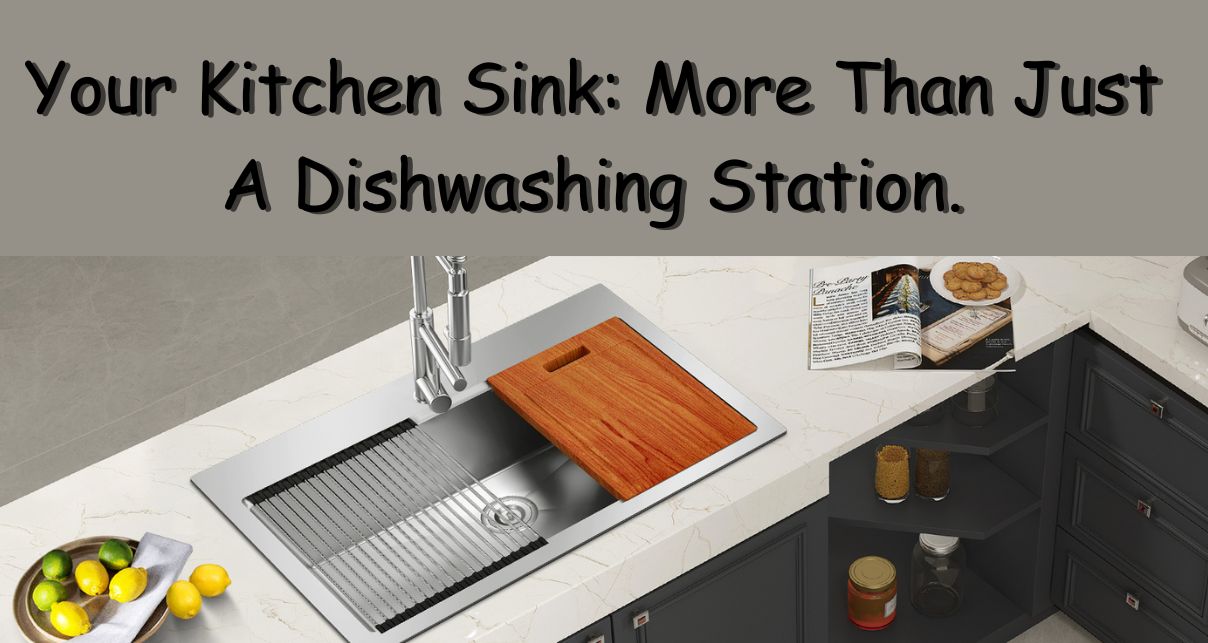Tackling The Root Causes of Odors and Stains in Your Kitchen Sink
A kitchen sink is one of the essential components of any kitchen. It is where you wash dishes, prepare food, and dispose of waste. However, over time, kitchen sinks can develop odors and stains that can be unsightly and unhygienic.Causes of Odors in Kitchen Sinks:
Clogged Drain:A clogged drain is the most common cause of bad odors in the kitchen sink. When food particles and debris get trapped in the drain, they begin to decompose, resulting in a foul smell. You can use a plunger or baking soda and vinegar to unclog the drain. Alternatively, you can hire a professional plumber to clear the blockage.
Bacterial Growth:
Bacteria thrive in damp environments, making kitchen sinks a breeding ground for them. These bacteria create foul-smelling gases that can be harmful to your health. To prevent bacterial growth, ensure that you wipe down the sink and surrounding area with a disinfectant regularly. You can also pour a solution of bleach and water down the drain to kill any bacteria.
Water Conditions:
The quality of water that runs through your kitchen sink can contribute to bad odors. High levels of minerals or chemicals can create a sulfuric smell. You can install a water filtration system to improve the quality of your water and eliminate any unpleasant smells.
Food Waste:
Leftover food scraps that are not disposed of correctly can lead to bad odors. Ensure that you dispose of food waste in a garbage can or a compost bin. Also, avoid putting large pieces of food down the drain, as they can get stuck and cause blockages.
Grease and Oil:
Grease and oil can accumulate in the pipes, causing blockages and leading to unpleasant smells. To prevent this, avoid pouring oil and grease down the drain. Instead, dispose of them in a separate container and throw it away.
Common Kitchen Ingredients:
Ingredients such as onions and garlic have strong smells that can linger in the sink. To eliminate these smells, run hot water down the drain for a few minutes, and then pour a mixture of baking soda and vinegar down the drain to neutralize any odors.
Plumbing Issues:
Plumbing issues such as a leaky pipe or a broken seal can cause unpleasant odors to emanate from the sink. If you suspect that you have a plumbing issue, call a professional plumber to inspect and repair the issue.

Causes of Stains in Kitchen Sinks:
Hard Water:Hard water is a major contributor to sink stains. When water has high levels of minerals such as calcium and magnesium, it can leave behind a residue on your sink surface. This residue can make your sink look dull and dirty. Over time, it can even lead to clogging of your sink's drainage system. To prevent hard water stains, use a water softener or add vinegar to your rinse cycle when cleaning dishes.
Rust:
Rust stains can occur due to pipes or fixtures that are made of iron or other metal. These stains can be stubborn and difficult to remove, but they can be prevented by replacing rusty parts with non-metallic ones. Also, regular cleaning with a natural rust remover can help to keep rust stains at bay.
Mineral Deposits:
Another cause of sink stains is mineral deposits. Minerals such as copper and brass can accumulate in your sink over time, causing discoloration. This is particularly true in areas with hard water. To prevent mineral deposits, rinse your sink frequently and avoid using harsh chemical cleaners.
Chemical Cleaners:
While chemical cleaners can help to remove stains and dirt from your sink, they can also cause discoloration and damage. Harsh chemicals can erode the surface of your sink, leaving it vulnerable to stains and other damage. To prevent this, use natural cleaners such as vinegar and baking soda when cleaning your sink. These cleaners are not only more eco-friendly, but they are also safer for your sink.
Lear more about Exploring the Surprising Benefits and a Well-Maintained Kitchen Sink
Frequently Asked Question:
Why Is the Water From My Sink Looking Cloudy?
If the water from your sink is looking cloudy, it is likely due to a buildup of minerals in the pipes. This is usually not a cause for concern, but if you notice that the water is consistently cloudy, it’s a good idea to have your plumbing system checked by a professional.
What Should I Do If My Sink Starts to Overflow?
If your sink starts to overflow, the first thing you should do is turn off the water. Once the water is off, you can start troubleshooting the problem. In most cases, an overflowing sink is caused by a clog. However, it could also be caused by a faulty P-trap. If you’re not sure what the problem is, it’s best to call a professional.
Why Is My Kitchen Sink’s Water Pressure Low?
If the water pressure in your sink is low, it could be due to a blockage in the pipes. Another possibility is that the aerator (the screen at the end of the faucet) is dirty and needs to be cleaned. You can also try adjusting the water pressure regulator. This is usually located under the sink.
Is My Kitchen Sink Connected to the Dishwasher?
Yes, in most cases, the kitchen sink is connected to the dishwasher. The dishwasher drains into the sink’s drain pipe, and the two are usually connected with a metal hose. If your dishwasher is leaking, it’s likely that there’s a problem with this hose.
What Is the Importance of Caulk in a Sink?
Caulk is a sealant that helps prevent water from leaking around the edges of your sink. It’s important to make sure that the caulk around your sink is in good condition because a leak can cause water damage. If you notice any cracks or gaps in the caulking, it’s best to replace it.At Tecasa, we highly recommend keeping your kitchen sink clean and dry to prevent unpleasant odors and stains. Avoid disposing of food waste down the drain and make sure to dispose of it properly. Regularly cleaning your sink with soap and water, and using a baking soda paste can help prevent both odors and stains. Additionally, promptly addressing any plumbing issues is crucial. By following these simple tips, you can ensure that your kitchen sink stays hygienic, clean, and free from any unpleasant odors.



